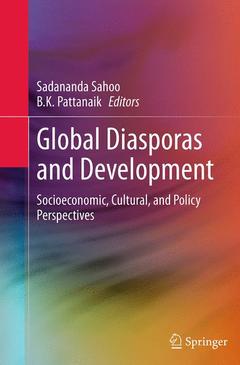Global Diasporas and Development, Softcover reprint of the original 1st ed. 2014 Socioeconomic, Cultural, and Policy Perspectives
Coordonnateurs : Sahoo Sadananda, Pattanaik B.K.

Chapter 1: Diaspora centred development: Current practice, critical commentaries and research priorities.- Chapter 2: The Link with a Home Country: A Comparative Analysis of Host-country Environments for Diaspora Engagement.- Chapter 3: Diasporas and Divergent Development in Kerala and Punjab: Querying the Migration-Development Discourse.- Chapter 4: Africa’s Money in Africa: Human and Physical Capital Dimensions.- Chapter 5: Diaspora Bonds and the Caribbean Economic Development.- Chapter 6: The African Brain Drain – Causes, Costs, Consequences.- Chapter 7:Diaspora, Brain circulation and Indian development: Perspective from Australia and New Zealand.- Chapter 8: Indian Diapora and Knowledge Transfer: Sectoral Perspectives and Challenges.- Chapter 9: Rethinking Development through Dynamics of Skilled Human Migration from India.- Chapter 10: Knowledge Diasporas: Narratives of Transnational Migration and Higher Education.- Chapter 11: Reverse Brain Drain: New Strategies by Developed and Developing Countries.- Chapter 12: The diaspora as carrier of soft knowledge for development to the home country: evidence from highly skilled Filipino migrants in New Zealand and Australia.- Chapter 13: Tapping Talents in India through Diasporas Network: Opportunities and Challenges.- Chapter 14: Muslim Diaspora and European Identity: The Politics of Inclusion and Exclusion.- Chapter 15: Diaspora, Cultural Disintegration and Underdevelopment: The Case of Zimbabwe in the Last Ten Years (2001 – 2011).- Chapter 16: Integration and ‘Limited Acculturation’ of Tibetans at Shimla: Experience and Perceptions of a Diaspora.- Chapter 17: The Dark Side of ‘Diaspora’ in Africa’s Great Lakes Region.- Chapter 18: Laws Protecting the Rights and Interests of Returned Overseas Chinese and Their Relatives: Their Relevance and Adaptation.- Chapter 19: Migrant Rights and the Citizenship Debate: The Case of Indian Workers in the GCC Countries.- Chapter 20:Diaspora in Mauritius: A Recipe for Contested Development.- Chapter 21: Does Role Mobility within Transnational Marriage Empower Immigrant Women?.- Chapter 22: Rationale for Establishing a Return and Retirement Fund for Indian Overseas Women Migrant Workers in the ECR Countries.- Chapter 23: “Irangeles – Identities in Motion: Representation of Migration in Films of the Iranian Diaspora.- Chapter 24: The Empire writes from within: The Kali Theatre Company, a case study.- Chapter 25: The creation of Diaspora and its historical significance: A Study of Amitav Ghosh’s Sea of Poppies.
Date de parution : 08-2016
Ouvrage de 399 p.
15.5x23.5 cm
Date de parution : 12-2013
Ouvrage de 399 p.
15.5x23.5 cm


